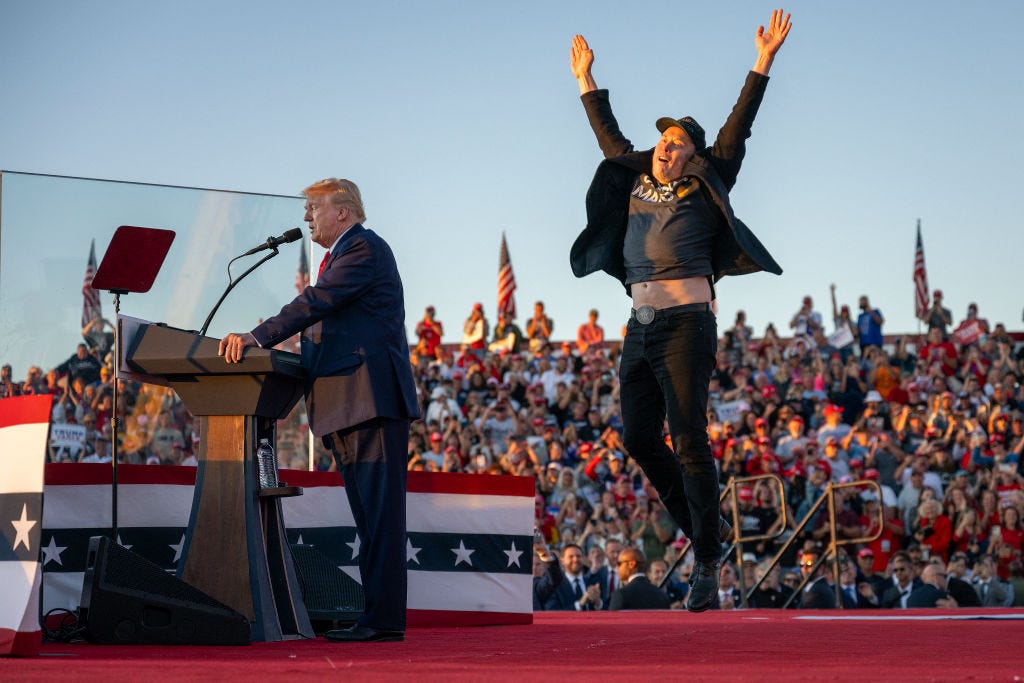It used to be the case that a news tycoon, such as Rupert Murdoch or William Randolph Hearst, could exert outsize influence on politics through his media weapons. If you had aspirations to be president, you didn’t want to get offside with Murdoch, and you needed to talk to the editorial board of the New York Times. Their endorsements mattered, and it was worth doing whatever you could to get generous coverage. For decades, the media elite and the political elite have mingled in a codependent relationship, if not exactly trading favors, then at least finding an alliance at the highest levels. Donald Trump and Kamala Harris didn’t have to care about those relationships this election. Instead they turned to Joe Rogan and Call Her Daddy. Instead they sought out social-media-friendly photo ops. The winning candidate, in fact, made a point of sticking it to the legacy media, even joking that he wouldn’t mind if the reporters at his rally got shot first during an assassination attempt. Those comments were reported in the mainstream press, but they were most talked about on social media. In fact, it was really happening mostly on X, since the largest social platforms—Facebook, Instagram, and Threads—preferred to suppress political discourse and just leave it to Elon. And what did Elon do with that power? He behaved just like Rupert Murdoch and William Hearst. On amphetamines. Those guys could only dream of having as much money as Elon. They could only dream of having as much power, reach, and influence as X. They could only dream of their competition deciding to put down their weapons so as not to upset their advertisers. The power shift from legacy media to social media, then, is not much of a shift at all. It’s just swapping one set of players for another. Zuckerberg chose not to use his power this time, but Elon, a media owner with more conflicts of interest than El Chapo, wasn’t so shy. He’s using X like Murdoch used Fox News. And he exploits the might of his platform, which reaches hundreds of millions and still influences the political narrative, to not only endorse but actively campaign for one candidate—a candidate who had promised him great powers if he won. Welcome to The Elon Times. Same old entangled interests, same old ruler impulses, same old elite power structures—just this time with memes. In The Elon Times, the star “columnists” and “anchors” aren’t Paul Krugmans or Walter Kronkites. They’re instead people whose platforms have been inflated to insane degrees by X’s heat-seeking algorithms. Ian Miles Cheong, Collin Rugg, and Mario Nawfal have more influence now than Anderson Cooper, Lester Holt, and Maureen Dowd—for as long as they remain in the good graces of the God King. And the man at the top, Elon himself, is the chief editorialist and propagandist, pushing his posts to the front of everyone’s feed, picking his favorites to amplify while proclaiming “News should come from the people,” flying the free-speech flag while promoting a soon-to-be-president who wants TV networks that broadcast content he doesn’t like to be taken off the air. Elon has made some incredible contributions to the world. Tesla’s cars are amazing and have upended the automobile industry. The literal genius rocket scientists at Boeing hadn’t figured out how to make rockets reusable before SpaceX; Mars is starting to look within reach. He is on the cusp of even more world-changing achievements in AI and brain-computer interfaces. No single figure since Steve Jobs has had such a revolutionary effect on business and technology. And now, despite his inexhaustible critics, he’s winning with X too. The 2024 election is over, and with it goes much of legacy media’s former glory. Elon, part-time media mogul, is stepping up to take Hearst’s place, and X has swapped itself in for CNN. However, unlike in the other industries Elon has transformed, in the most fundamental ways, nothing important has changed. We just traded the old boss for a new boss. As much as Elon trumpets the democratizing power of X, he’s wielding it as a tool to serve his partisan interests. The world desperately needs an alternative to these old power structures. That’s why we feel our mission at Substack—to build a new economic engine for culture—is more urgent than ever. We, at Substack, are partisans too. But we do not seek the favor of any one ruler. The politics of our platform have always been the same: we want to elevate writers and creators and give them a business model that supports their editorial freedom and connects them directly with the audience that values them. That means we don’t tell them what to think, or who to vote for, and we align our success with theirs. The media system needs a place that celebrates independence in every sense of the word; it needs a network that martials the power of the internet not to empower new rulers who favor different politicians, but to usher in new rules that return power to the people. We hope to keep building it with you. |
Search thousands of free JavaScript snippets that you can quickly copy and paste into your web pages. Get free JavaScript tutorials, references, code, menus, calendars, popup windows, games, and much more.
The Elon Times
Subscribe to:
Post Comments (Atom)
Renowned Water Expert Reynold Aquino Offers Exclusive Water Softener Discounts
Los Angeles, California - November 21, 2024 - World-renowned water expert Reynold Aquino is excited to announce exclusive discounts on prem...
-
code.gs // 1. Enter sheet name where data is to be written below var SHEET_NAME = "Sheet1" ; // 2. Run > setup // // 3....

No comments:
Post a Comment